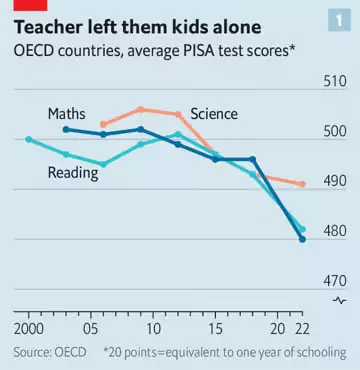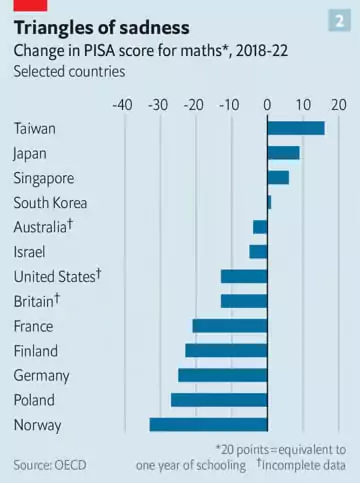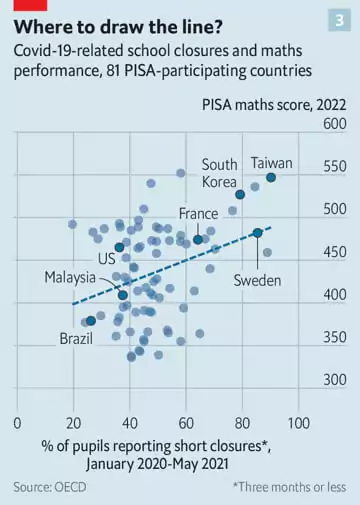The pandemic’s unprecedented disruption of education has resulted in a significant decline in student performance worldwide, raising concerns about long-term consequences on academic achievement and economic prospects.

✅ AI Essay Writer ✅ AI Detector ✅ Plagchecker ✅ Paraphraser
✅ Summarizer ✅ Citation Generator
Key Takeaways:
- The pandemic has led to a substantial decline in student performance worldwide.
- Lost learning could significantly impact students’ future earnings and economic opportunities.
- Some countries managed to maintain or improve student performance despite the pandemic.
- Financial investments alone are insufficient; reforms in teaching quality and resource allocation are crucial.
- The focus should not only be on recovering lost learning but on innovating and improving educational systems for the future.
The COVID-19 pandemic, a global health crisis that began in late 2019, has led to one of the most significant disruptions in education since World War II. School closures affected approximately 1.6 billion students globally, leading to a shift to remote learning or, in some cases, a complete halt in education. This disruption has had a profound impact on student learning, with recent data revealing a substantial decline in academic performance. The extent of this educational crisis, highlighted in the latest OECD report, poses serious challenges for future generations and underscores the need for comprehensive strategies to address learning gaps and reform educational systems.
Impact on Student Performance
The pandemic’s effect on education has been both deep and wide-ranging. According to the OECD’s Programme for International Student Assessment (PISA), there has been a notable decline in student performance in maths, reading, and science. This decline is evident in the latest round of PISA tests, conducted between March and November of the previous year, where 15-year-olds from various countries, including Japan, Singapore, and South Korea, participated. The results showed a startling drop in scores compared to pre-pandemic levels, indicating a loss equivalent to half to three-quarters of a school year’s learning. The magnitude of this decline cannot be overstated.

A rule of thumb in education economics suggests that each additional year of schooling increases a person’s annual income by about 10%.
Therefore, the learning loss due to the pandemic could have long-lasting economic repercussions. For instance, students who experience a dip in grades may face challenges in graduating from high school or acquiring the skills necessary for university success. Degree-holders typically earn about 50% more than those entering the workforce straight out of school, highlighting the economic implications of educational setbacks.
In countries like France, Germany, and Poland, 15-year-olds now perform at levels typical of students a year younger, particularly in mathematics. The situation is concerning in America and Britain as well, although their data requires cautious interpretation due to testing challenges. Nevertheless, there’s evidence of declining scores, particularly in Britain, where reading scores have regressed to levels last seen in 2006. America’s struggle is more pronounced in mathematics, where students have long ranked in the lower third of OECD countries. The pandemic has further exacerbated these challenges.

Interestingly, the pandemic’s impact on education has been somewhat uneven. Countries like Japan, Singapore, South Korea, and Taiwan not only maintained their test scores but, in some cases, saw improvements. This variance can be attributed to different approaches to managing school closures and the quality of remote education. For example, South Korea implemented strict social distancing and hired additional teaching staff, including retirees, to support learning during the pandemic.

The Road to Educational Recovery
The path to reviving education systems worldwide is fraught with challenges. In Britain, around £3.5 billion has been allocated for catch-up programs, with a focus on tutoring. However, this funding is expected to dry up next year. Similarly, in America, $190 billion in federal relief funds have been allocated to schools, but there’s considerable freedom in how this money is spent. Only a fraction is earmarked specifically for addressing learning loss. American students, meanwhile, have not shown significant progress in catching up, with many still lagging behind pre-pandemic learning rates.
The urgency to revitalize schooling is clear, but it requires more than just financial investments.
While increasing school funding can yield improvements, this effect plateaus beyond a certain spending threshold. America exemplifies this, spending over $140,000 per pupil without achieving the academic outcomes of countries like Japan, which spends significantly less. This highlights the need for strategic investments and reforms rather than simply pouring more money into existing structures.
Education experts argue for a shift from “building back better” to “building forward differently.” This entails improving teacher training and motivation, a more effective strategy than reducing class sizes. Additionally, there’s a need to ensure that resources are adequately distributed to the schools and students most in need.
Final Thoughts
The COVID-19 pandemic has caused a historic disruption in global education, leading to significant learning losses. This has profound implications for students’ future economic prospects and the broader society. Addressing this crisis requires not only financial investment but strategic reforms focused on improving teaching quality and ensuring equitable resource distribution. The challenge lies in not just recovering lost learning but in seizing the opportunity to improve and innovate within educational systems.
Follow us on Reddit for more insights and updates.





Comments (0)
Welcome to A*Help comments!
We’re all about debate and discussion at A*Help.
We value the diverse opinions of users, so you may find points of view that you don’t agree with. And that’s cool. However, there are certain things we’re not OK with: attempts to manipulate our data in any way, for example, or the posting of discriminative, offensive, hateful, or disparaging material.